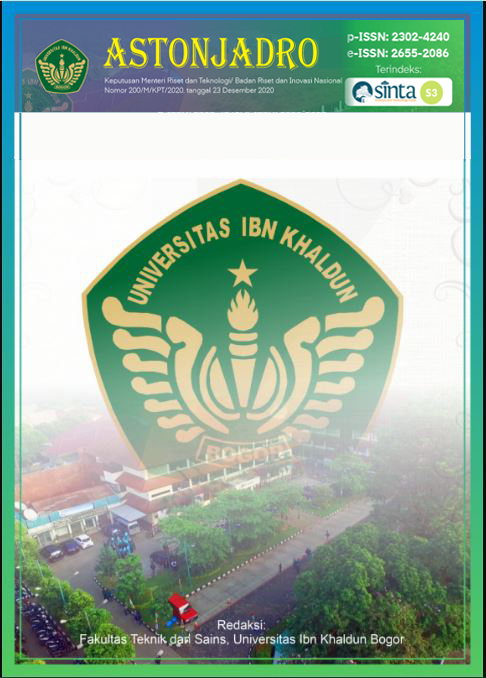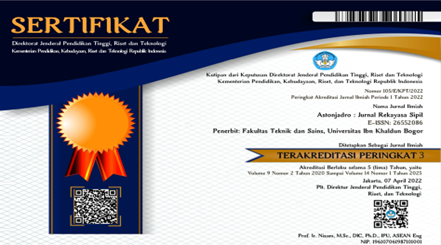Analysis of Drowsiness Detection based on Images Using Convolutional Neural Network
DOI:
https://doi.org/10.32832/astonjadro.v13i2.14888Keywords:
drowsiness detection using CNN; AlexNet; ResNet; AlexNet; ResNet Comparison.Abstract
Drowsiness detection is crucial in maintaining the safety and alertness of individuals, especially in high-risk situations such as driving or operating heavy machinery. This research aims to develop a drowsiness detection system based on facial images using Convolutional Neural Network (CNN) with a focus on the AlexNet method and its comparison with ResNet. In this study, facial image data was collected from various conditions of drowsiness and normal conditions. Image preprocessing was performed to standardize the size and ensure consistent image quality. AlexNet and ResNet were implemented and trained using the image dataset to identify distinctive patterns that differentiate drowsy faces from faces in a normal state. The results of the experiments showed that the use of AlexNet and ResNet methods effectively detects drowsiness in facial images with high accuracy. However, there are performance differences between the two methods. ResNet demonstrated superior performance in certain conditions, while AlexNet showed advantages in other cases. This research contributes to the development of facial image-based drowsiness detection technology applicable in various fields, including smart vehicles and security systems. The comparison results between AlexNet and ResNet also provide valuable insights for selecting the most suitable CNN method for drowsiness detection applications based on facial images.
References
Abdurohman, D., Putra, H. M., & Nurdin, I. (2020). Tinjauan Fiqih Muamalah Terhadap Jual Beli Online. Ecopreneur, 1, 35–48.
Asmoro, B. P., & Mukti, F. D. (2019). Peningkatan rasa ingin tahu ilmu pengetahuan alam melalui model contextual teaching and learning pada siswa kelas va sekolah dasar negeri karangroto 02. Abdau: Jurnal Pendidikan Madrasah Ibtidaiyah, 2(1), 104–128.
Ferber, R. (2006). Solve your child’s sleep problems: new, revised. Simon and Schuster.
Karim, H. A., Lis Lesmini, S. H., Sunarta, D. A., SH, M. E., Suparman, A., SI, S., Kom, M., Yunus, A. I., Khasanah, S. P., & Kom, M. (2023). Manajemen transportasi. Cendikia Mulia Mandiri.
Kittur, A., Nickerson, J. V, Bernstein, M., Gerber, E., Shaw, A., Zimmerman, J., Lease, M., & Horton, J. (2013). The future of crowd work. Proceedings of the 2013 Conference on Computer Supported Cooperative Work, 1301–1318.
Krueger, G. P. (1989). Sustained work, fatigue, sleep loss and performance: A review of the issues. Work & Stress, 3(2), 129–141.
Mangatta, B. H. (2016). Strategi Adaptasi Tukang Becak Dalam Kehidupan Sosial Ekonomi (Studi Kasus Tukang Becak di Kelurahan Bontobiraeng Kecamatan Mamajang Kota Makassar). HOLISTIK, Journal of Social and Culture.
Mardhiyana, D., & Sejati, E. O. W. (2016). Mengembangkan kemampuan berpikir kreatif dan rasa ingin tahu melalui model pembelajaran berbasis masalah. PRISMA, Prosiding Seminar Nasional Matematika, 672–688.
Mowlana, H. (1997). Global information and world communication: New frontiers in international relations. Global Information and World Communication, 1–288.
Rini, W. N. E., Aurora, W. I. D., & Kusmawan, D. (2022). Pendekatan Structural Equation Modeling Kelelahan Kerja pada Pekerja Perkebunan Kelapa Sawit. Window of Health: Jurnal Kesehatan, 633–641.
Rosa, J., Teixeira, C., & Pinto, J. S. (2013). Risk factors in e-justice information systems. Government Information Quarterly, 30(3), 241–256.
Techera, U., Hallowell, M., Stambaugh, N., & Littlejohn, R. (2016). Causes and consequences of occupational fatigue. Journal of Occupational and Environmental Medicine, 58(10), 961–973.
Xing, X., Zhong, B., Luo, H., Rose, T., Li, J., & Antwi-Afari, M. F. (2020). Effects of physical fatigue on the induction of mental fatigue of construction workers: A pilot study based on a neurophysiological approach. Automation in Construction, 120, 103381.
Zamzami, F., Nusa, N. D., & Faiz, I. A. (2021). Sistem Informasi Akuntansi. Ugm Press.
IMGD Nugraha, SA Paturusi, DGAD Putra. (2023). Poverty effect and population density towards the quality of fishermen's settlement environment in Kusamba. ASTONJADRO 12 (2), 360-367.
NPKC Devi, C Trimarianto. (2022). COMPATIBILITY OF WASTE MANAGEMENT PLACES AT TPS3R KSM BAYU SUCI, SUB-DISTRICT MARGA. ASTONJADRO 11 (2), 326-332.
SD Pratama, P Hadi, Hamkah, Mansyur, P Haerul, H Arman, IA Arifuddin, I Andi, S.Syaiful. (2024). MANAJEMEN PROYEK INFRASTRUKTUR. Tohar Media. Makassar, 1-153.
I Sabariah, S Syaiful, NI Hayati. (2012). ANALISIS METODE NETWORK PLANNING DAN S-CURVE PROYEK KONSTRUKSI DI BOGOR. ASTONJADRO 1 (1), 28-34.
Downloads
Published
How to Cite
Issue
Section
License
Copyright (c) 2024 ASTONJADRO

This work is licensed under a Creative Commons Attribution-ShareAlike 4.0 International License.
Paper submitted to ASTONJADRO is the sole property of the Astonjadro Journal. Unless the author withdraws the paper because he does not want to be published in this journal. The publication rights are in the journal Astonjadro.ASTONJADRO
LICENSE
This work is licensed under a Creative Commons Attribution-ShareAlike 4.0 International License.
Based on a work at http://ejournal.uika-bogor.ac.id/index.php/ASTONJADRO













